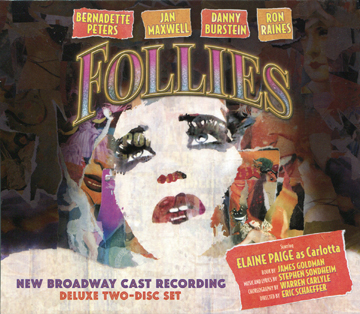Though the acclaimed revival of Follies will end its limited engagement on January 22, the landmark production has produced a staggering cast album, recorded by PS Classics and is without question a must-have and must-hear. The lavish 2-disc set captures is almost complete, capturing most of the score (more on that later) with its original orchestration intact (rare for any musical these days, most especially for a Sondheim show). It also may be the greatest album PS Classics has ever released; regardless of whether you agree with me or not, it is a spectacular achievement.
There are already four official recordings of Follies available on the market. There’s the devastatingly truncated original that preserves some incredible snippets of the performances (particularly Alexis Smith’s “Could I Leave You?” and Dorothy Collins’ “Losing My Mind”), the original London cast with its considerable changes, as well as the famed live concert recording Follies in Concert (or as I think of it, Follies without Context) and the most complete reading of the score, including cut material, the 1998 PaperMill production.
This latest Follies is as essential as these four. While I can’t say the album is definitive (the production and this recording lack the dance specialty “Bolero d’Amore”), it comes quite close. The album carefully captures the show in a way that in some ways improves upon the stage production, most specifically the inclusion of elements from the original 1971 libretto. In effect, the album is more like a radio play. Much of what is spoken is contained on separate tracks so you can program those out if you’re not a fan of that on cast albums (and knowing the friends I have, there are many who are not).
The disc captures the best of what’s onstage: Danny Burstein’s staggering portrayal of Buddy Plummer, with “The Right Girl” and especially “The God-Why-Don’t-You-Love-Me Blues.” Jan Maxwell’s brittle sophistication shines through, and the way she lands “GUESS!” in “Could I Leave You?” is one of the most satisfying things I have ever heard. Bernadette Peters tones down some of the more neurotic aspects of her onstage character for a more solidly sung performance on disc. Meanwhile, Ron Raines lends gravitas and his large baritone voice to Ben Stone’s mid-life crisis.
Onto the featured players, Elaine Paige sings a socko “I’m Still Here,” while Terri White tears into “Who’s That Woman?” which includes all the ad libs tossed around during the dance sequences. Rosalind Elias and Leah Horowitz are in glorious voice on “One More Kiss” while Susan Watson, Don Correia, the glamorous Mary Beth Peil and Jayne Houdyshell tear into the Montage trio. Every song is a gem, and each one has been recorded with great care.
One of the stars of this production, and subsequent recording, is the 28 piece orchestra conducted by James Moore. This production marked the first time I had seen a Sondheim production on Broadway using the original orchestration, and does it make all the difference. Kudos to Tommy Krasker and the team at PS Classics, as this recording brings out the colors and nuances in Jonathan Tunick’s brilliant charts with great clarity.
The double disc album is beautifully packaged by PS Classics, with a lavish booklet including an essay from NY1’s Patrick Pancheco, a personal note from album producer Tommy Krasker and a plot synopsis by Sean Patrick Flahaven. Also included are the show’s complete lyrics, as well as the dialogue heard throughout. Interspersed are some stunning photographs of the production. I don’t remember the last time a cast album was as stunning to look at as well as hear.



